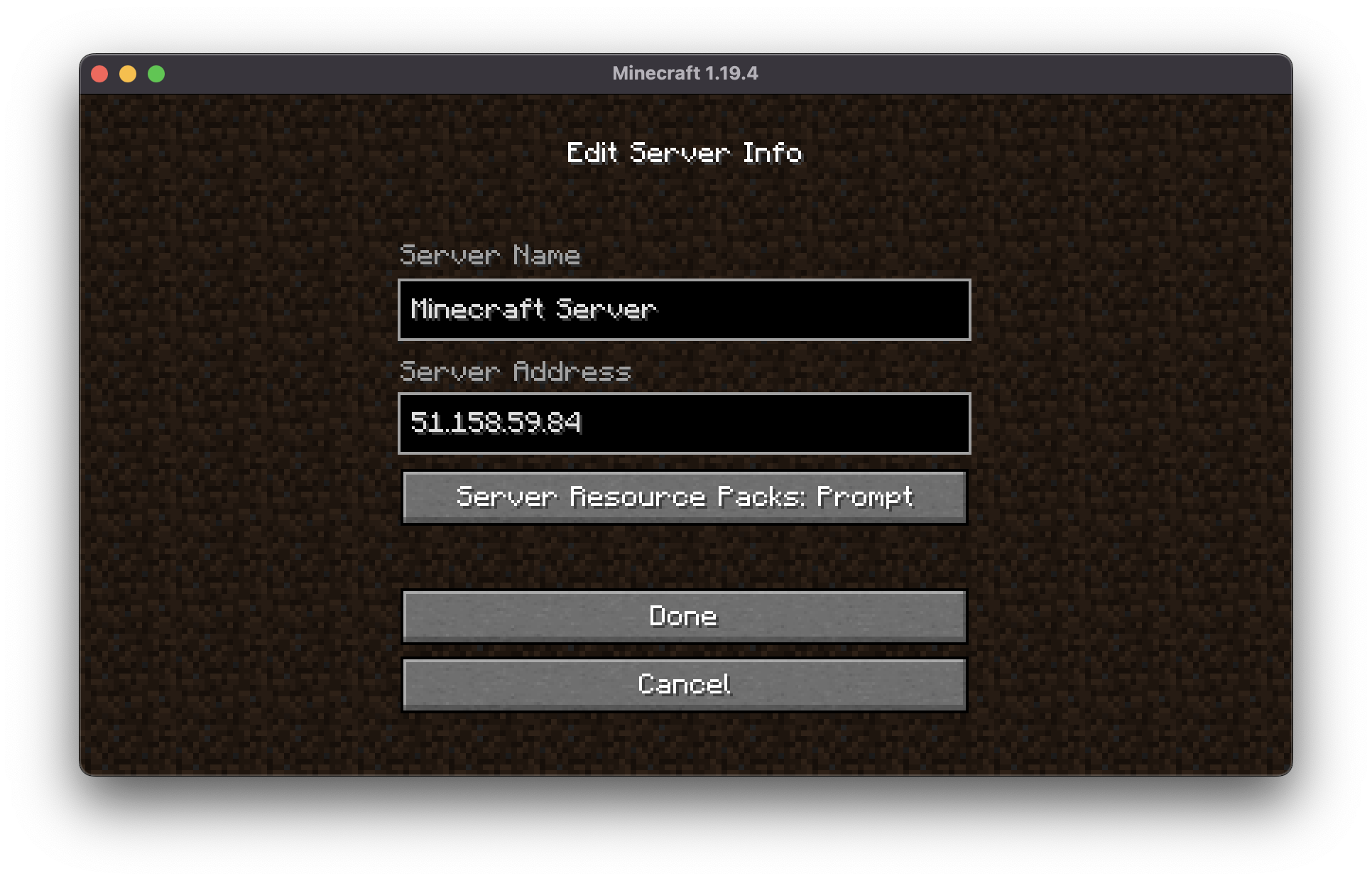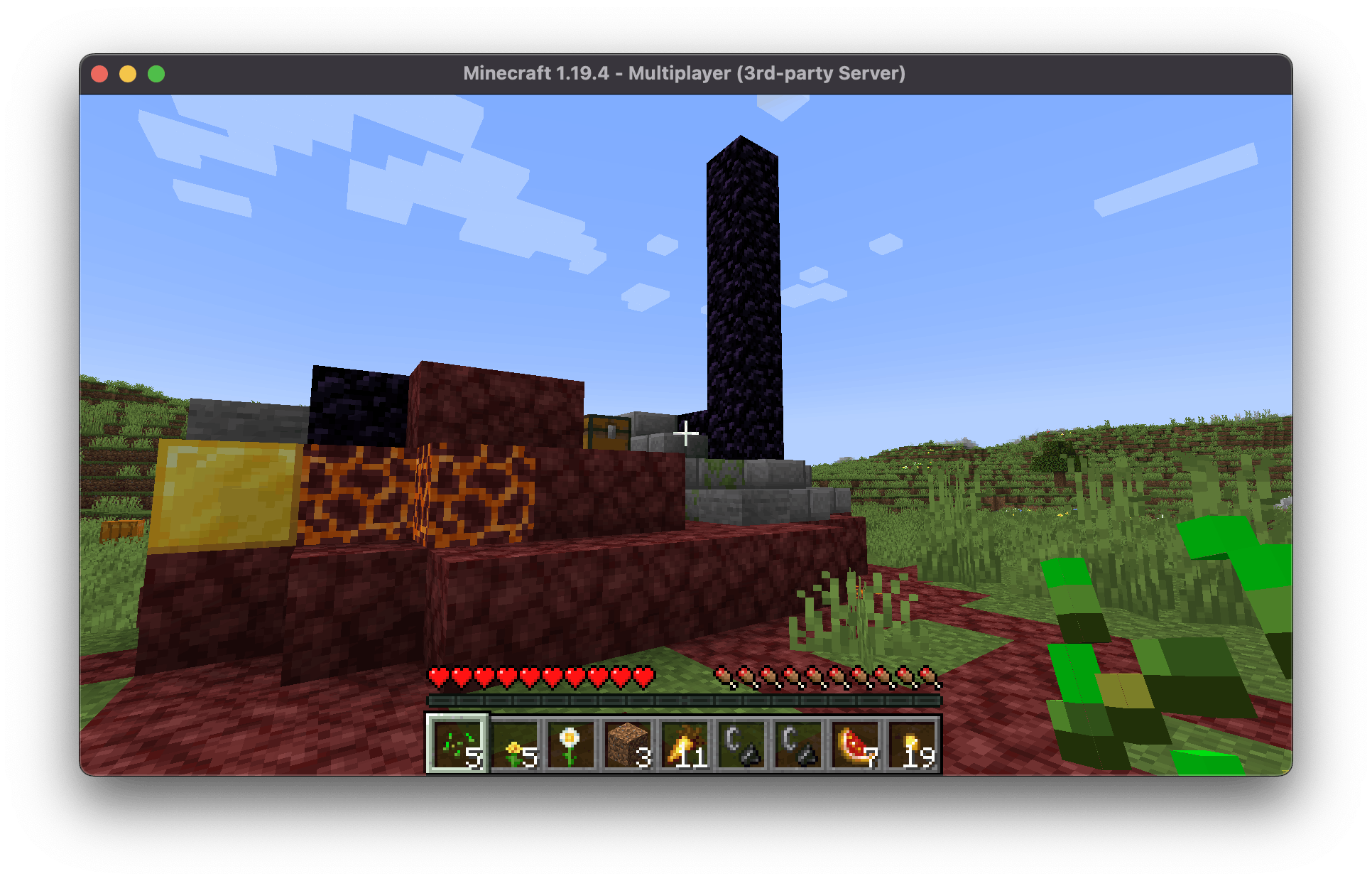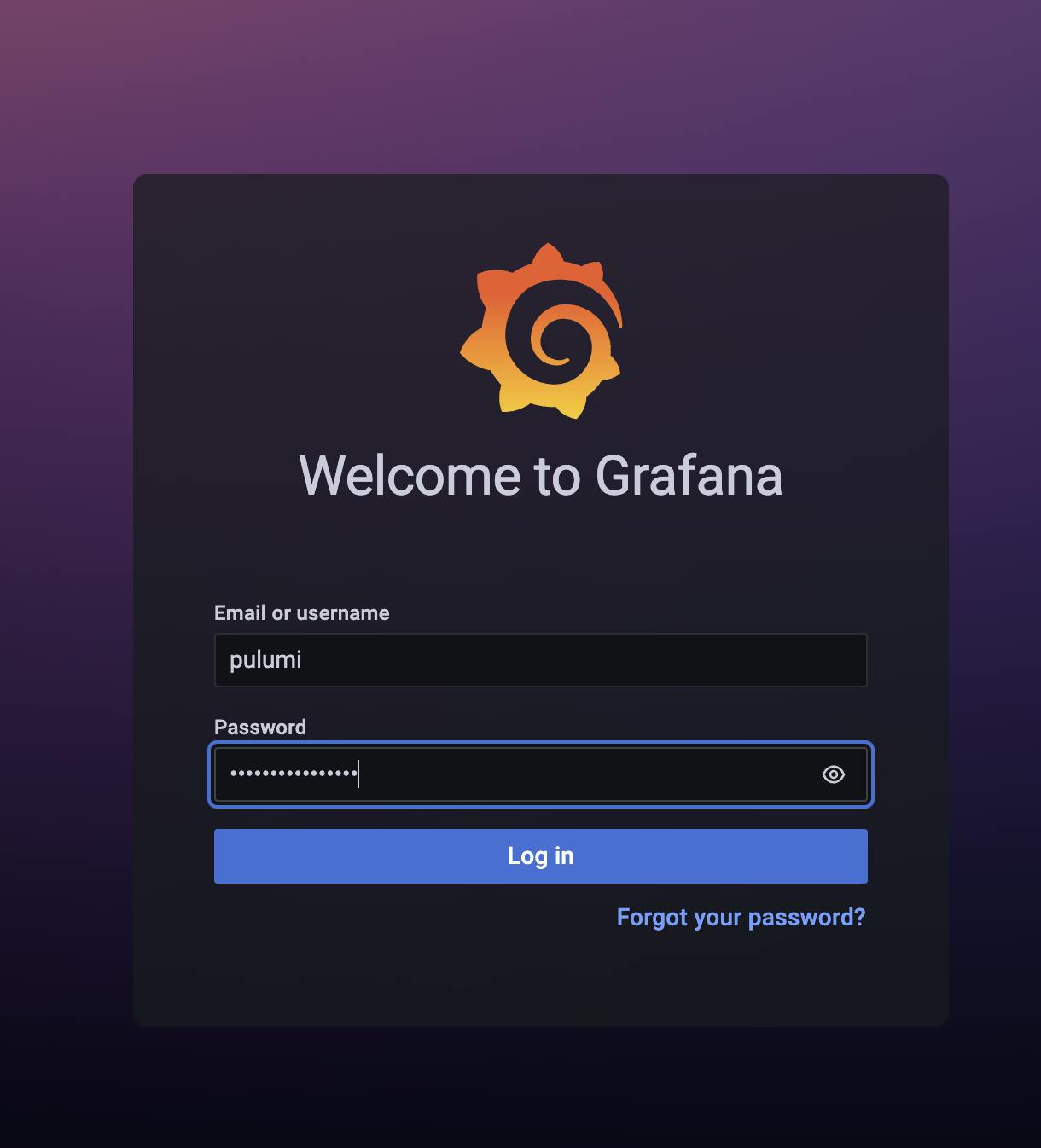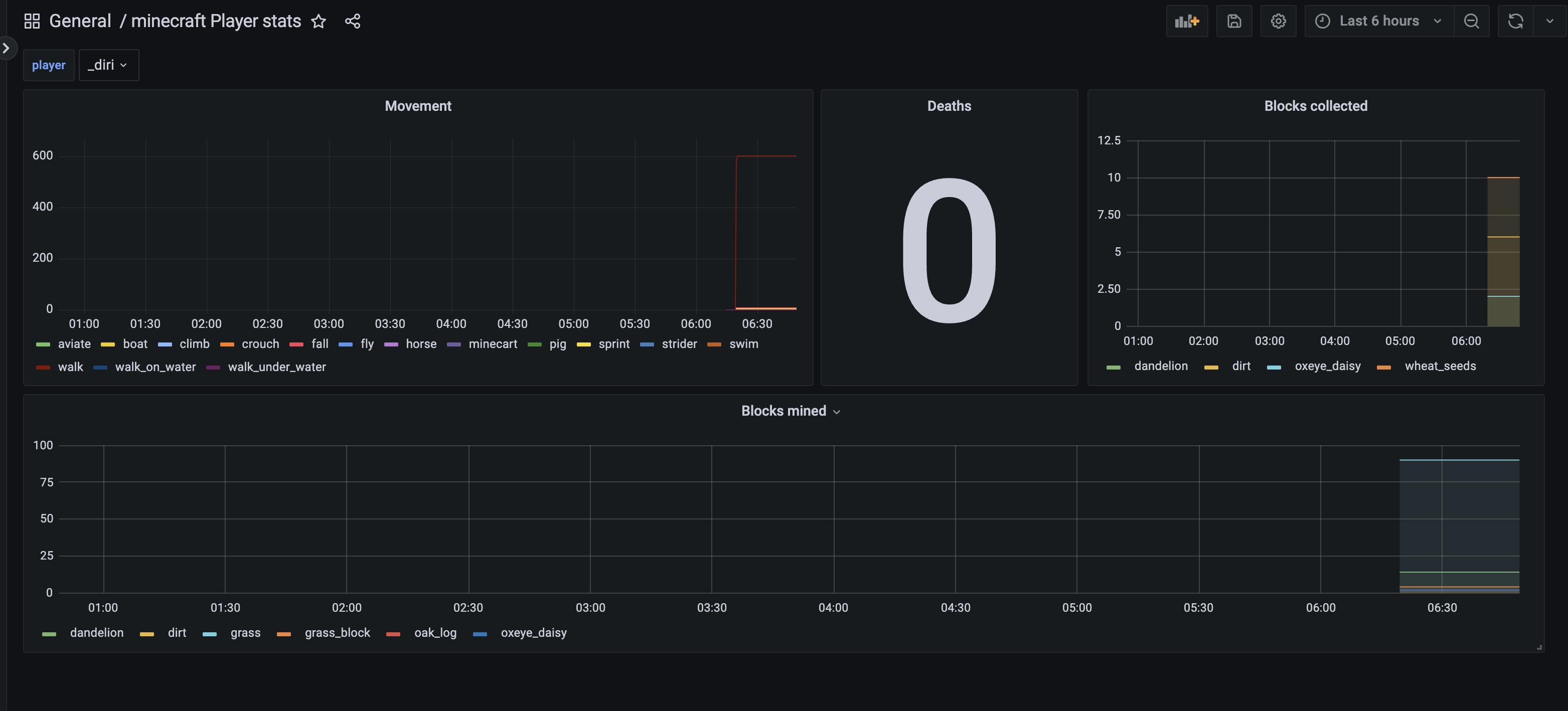Minecraft Server: Secrets, Observability, Kubernetes and more with Pulumi and Scaleway
TL;DR: Code
Introduction
In this tutorial, I want to use some new Beta services from Scaleway to deploy a Minecraft server on Kubernetes. To deploy the infrastructure I will be using Pulumi, a modern infrastructure as code tool. Because nobody wants to manage infrastructure by hand, right?
So what are the new Scaleway services we will be using? For the whole observability part, we're going to use Cockpit. Cockpit is the new monitoring and logging tool from Scaleway. To handle the secrets we will use external-secrets Kubernetes operator and as backed we will use the new Secret Manager from Scaleway.
And yes, we will use the new Scaleway Managed Kubernetes Service called Kapsule as a runtime for all of this.
So without further ado, let's get started!
Prerequisites
If you want to follow along, you need to have the following installed:
A Scaleway account with a valid access key and secret key
kubectl if you want to interact with the Kubernetes cluster
Setup your Pulumi project
To get things started, we need to create a new Pulumi project. Create a new directory and run pulumi new inside of it, as I am going to use Go for this tutorial, I will select go to use a predefined template for this blog post.
You can find more about Pulumi templates here.
mkdir pulumi-scaleway-kapsule && cd pulumi-scaleway-kapsule
pulumi new go --force
I left all the default values as they are, no need to change anything here.
This command will walk you through creating a new Pulumi project.
Enter a value or leave blank to accept the (default), and press <ENTER>.
Press ^C at any time to quit.
project name: (pulumi-scaleway-kapsule)
project description: (A minimal Go Pulumi program)
Created project 'pulumi-scaleway-kapsule'
Please enter your desired stack name.
To create a stack in an organization, use the format <org-name>/<stack-name> (e.g. `acmecorp/dev`).
stack name: (dev)
Created stack 'dev'
Installing dependencies...
Finished installing dependencies
Your new project is ready to go! ✨
To perform an initial deployment, run `pulumi up`
To use the Scaleway provider, we can add it using the go get command:
go get github.com/dirien/pulumi-scaleway/sdk/v2
And as we deploy several Helm charts, we need to add the Kubernetes provider too:
go get github.com/pulumi/pulumi-kubernetes/sdk/v3
And that's it from a Go dependency perspective. Your go.mod should look like this:
module pulumi-scaleway-kapsule
go 1.20
require (
github.com/dirien/pulumi-scaleway/sdk/v2 v2.13.1
github.com/pulumi/pulumi-kubernetes/sdk/v3 v3.24.2
github.com/pulumi/pulumi/sdk/v3 v3.58.0
)
Setup your Pulumi stack
Now with the project setup done, we can start to create our infrastructure. Head over to the main.go file and add the following code:
package main
import (
"fmt"
"github.com/dirien/pulumi-scaleway/sdk/v2/go/scaleway"
"github.com/pulumi/pulumi-kubernetes/sdk/v3/go/kubernetes"
"github.com/pulumi/pulumi-kubernetes/sdk/v3/go/kubernetes/apiextensions"
v1 "github.com/pulumi/pulumi-kubernetes/sdk/v3/go/kubernetes/core/v1"
"github.com/pulumi/pulumi-kubernetes/sdk/v3/go/kubernetes/helm/v3"
metav1 "github.com/pulumi/pulumi-kubernetes/sdk/v3/go/kubernetes/meta/v1"
"github.com/pulumi/pulumi/sdk/v3/go/pulumi"
)
func main() {
pulumi.Run(func(ctx *pulumi.Context) error {
return nil
})
}
This is the basic structure of a Pulumi program. We have a main function which will be called by Pulumi and inside of this function we can create our infrastructure.
We start by creating a new Scaleway project. Scaleway has a concept of projects, which are basically a groupings of different resources. This is useful if you want to separate different environments like dev, staging and prod and makes it easier to manage with IAM.
package main
// omitting imports
func main() {
pulumi.Run(func(ctx *pulumi.Context) error {
project, err := scaleway.NewAccountProject(ctx, "scaleway-project", &scaleway.AccountProjectArgs{
Name: pulumi.String("pulumi-scaleway-kapsule"),
})
if err != nil {
return err
}
return nil
})
}
Now we have a Scaleway project created, we can create our Cockpit instance. We create also a Cockpit token, which allows you to authenticate against the Cockpit API. We can select the token permissions on creation too.
The following permissions are available:
Push: this allows you to send your metrics and logs to your Cockpit.
Query: this allows you to fetch your metrics and logs from your Cockpit.
Rules: allow you to configure alerting and recording rules.
Alerts: allow you to set up the alert manager.
Cockpit uses under-the-hood Cortex (Metrics and Alertmanager) and Loki. You get all of them dedicated API URLs:
Alertmanager: alertmanager.prd.obs.fr-par.scw.cloud
The final resource, we create in the Cockpit context is a local Grafana user. We use this user to authenticate against the managed Grafana instance from Scaleway. There are two roles you can select:
Editor: this allows you to edit dashboards and create new ones.
Viewer: allows you to only view dashboards.
package main
// omitting imports
func main() {
pulumi.Run(func(ctx *pulumi.Context) error {
project, err := scaleway.NewAccountProject(ctx, "scaleway-project", &scaleway.AccountProjectArgs{
Name: pulumi.String("pulumi-scaleway-kapsule"),
})
if err != nil {
return err
}
cockpit, err := scaleway.NewCockpit(ctx, "scaleway-cockpit", &scaleway.CockpitArgs{
ProjectId: project.ID(),
})
if err != nil {
return err
}
cockpitToken, err := scaleway.NewCockpitToken(ctx, "scaleway-cockpit-token", &scaleway.CockpitTokenArgs{
Name: pulumi.String("cockpit-token"),
ProjectId: cockpit.ProjectId,
Scopes: scaleway.CockpitTokenScopesArgs{
QueryLogs: pulumi.Bool(true),
WriteLogs: pulumi.Bool(true),
QueryMetrics: pulumi.Bool(true),
WriteMetrics: pulumi.Bool(true),
},
})
if err != nil {
return err
}
user, err := scaleway.NewCockpitGrafanaUser(ctx, "scaleway-cockpit-grafana-user", &scaleway.CockpitGrafanaUserArgs{
ProjectId: cockpit.ProjectId,
Role: pulumi.String("editor"),
Login: pulumi.String("pulumi"),
})
if err != nil {
return err
}
ctx.Export("grafana-password", pulumi.ToSecret(user.Password))
return nil
})
}
With the Scaleway Cockpit service defined, we can now create the Scaleway Secret Manager. We will use this service to store our Minecraft RCON password. To retrieve the password in our Kubernetes cluster, we will use later the external-secrets Operator. We will also create a dedicated IAM user and a dedicated IAM policy for fetching the secret.
Keep in mind to change the please-change-me password later on in the Console, I just need this to get the example working as the Helm chart to deploy the Minecraft server requires a Kubernetes secret with the RCON password.
The IAM API key will be used by the external-secrets Operator to authenticate against the Scaleway Secret Manager API.
package main
// omitting imports
func main() {
pulumi.Run(func(ctx *pulumi.Context) error {
// omitting previous code
secret, err := scaleway.NewSecret(ctx, "scaleway-secret", &scaleway.SecretArgs{
Name: pulumi.String("scaleway-secret"),
ProjectId: project.ID(),
})
if err != nil {
return err
}
_, err = scaleway.NewSecretVersion(ctx, "scaleway-secret-version", &scaleway.SecretVersionArgs{
SecretId: secret.ID(),
Data: pulumi.String("please-change-me"),
})
if err != nil {
return err
}
iamApplication, err := scaleway.NewIamApplication(ctx, "scaleway-iam-application", &scaleway.IamApplicationArgs{
Name: pulumi.String("pulumi-application"),
})
if err != nil {
return err
}
_, err = scaleway.NewIamPolicy(ctx, "scaleway-iam-policy", &scaleway.IamPolicyArgs{
Name: pulumi.String("pulumi-scaleway-iam-policy"),
ApplicationId: iamApplication.ID(),
Rules: scaleway.IamPolicyRuleArray{
&scaleway.IamPolicyRuleArgs{
ProjectIds: pulumi.StringArray{
project.ID(),
},
PermissionSetNames: pulumi.StringArray{
pulumi.String("SecretManagerFullAccess"),
},
},
},
})
if err != nil {
return err
}
key, err := scaleway.NewIamApiKey(ctx, "scaleway-iam-api-key", &scaleway.IamApiKeyArgs{
ApplicationId: iamApplication.ID(),
})
if err != nil {
return err
}
return nil
})
}
Note: The IAM Policy permission is set to
SecretManagerFullAccess
Finally, we can create our Kubernetes cluster. We will use the Scaleway Kapsule service to create a managed Kubernetes cluster and add a node pool to it. There are a lot of options available to configure the cluster and the node pool. I tried to select the most important ones.
Feel free to change them to your needs.
package main
// omitting imports
func main() {
pulumi.Run(func(ctx *pulumi.Context) error {
// omitting previous code
k8sCluster, err := scaleway.NewK8sCluster(ctx, "k8s-cluster", &scaleway.K8sClusterArgs{
Name: pulumi.String("pulumi-scaleway-kapsule"),
Version: pulumi.String("1.26"),
Cni: pulumi.String("cilium"),
AutoUpgrade: scaleway.K8sClusterAutoUpgradeArgs{
Enable: pulumi.Bool(true),
MaintenanceWindowDay: pulumi.String("sunday"),
MaintenanceWindowStartHour: pulumi.Int(3),
},
AdmissionPlugins: pulumi.StringArray{
pulumi.String("AlwaysPullImages"),
},
DeleteAdditionalResources: pulumi.Bool(true),
ProjectId: project.ID(),
})
if err != nil {
return err
}
pool, err := scaleway.NewK8sPool(ctx, "k8s-pool", &scaleway.K8sPoolArgs{
Name: pulumi.String("pulumi-scaleway-kapsule-pool"),
ClusterId: k8sCluster.ID(),
NodeType: pulumi.String("PLAY2-MICRO"),
Autoscaling: pulumi.BoolPtr(true),
MinSize: pulumi.Int(1),
MaxSize: pulumi.Int(3),
Size: pulumi.Int(1),
Autohealing: pulumi.BoolPtr(true),
})
if err != nil {
return err
}
return nil
})
}
Deploying the Observability Stack
Now with the infrastructure in place, we can deploy the observability stack onto our recently created Kubernetes cluster. For this, we will use the pulumi-kubernetes provider as it offers us a handy way to deploy Helm charts. The helm.Release resource is our key component here.
Our observability stack will consist of the following components:
kube-prometheus-stack, but without deploying Grafana. We will use the Scaleway Cockpit Grafana instance instead.
promtail, to collect logs from our Kubernetes cluster.
Both stacks are configured to use the remote write feature to forward metrics and logs to the Scaleway Cockpit service. And as both endpoints are protected, we have to use the IAM API key we created earlier to authenticate against it.
package main
// omitting imports
func main() {
pulumi.Run(func(ctx *pulumi.Context) error {
// omitting previous code
kubernetesProvider, err := kubernetes.NewProvider(ctx, "k8s-provider", &kubernetes.ProviderArgs{
Kubeconfig: k8sCluster.Kubeconfigs.Index(pulumi.Int(0)).ConfigFile(),
EnableServerSideApply: pulumi.Bool(true),
}, pulumi.DependsOn([]pulumi.Resource{k8sCluster, pool}))
if err != nil {
return err
}
kubePrometheusStack, err := helm.NewRelease(ctx, "kube-prometheus-stack", &helm.ReleaseArgs{
Name: pulumi.String("kube-prometheus-stack"),
Chart: pulumi.String("kube-prometheus-stack"),
RepositoryOpts: helm.RepositoryOptsArgs{
Repo: pulumi.String("https://prometheus-community.github.io/helm-charts"),
},
Namespace: pulumi.String("monitoring"),
Version: pulumi.String("45.7.1"),
CreateNamespace: pulumi.BoolPtr(true),
Values: pulumi.Map{
"grafana": pulumi.Map{
"enabled": pulumi.Bool(false),
},
"kube-state-metrics": pulumi.Map{
"enabled": pulumi.Bool(true),
},
"prometheus-node-exporter": pulumi.Map{
"enabled": pulumi.Bool(true),
"prometheus": pulumi.Map{
"monitor": pulumi.Map{
"enabled": pulumi.Bool(true),
},
},
},
"prometheus": pulumi.Map{
"prometheusSpec": pulumi.Map{
"remoteWrite": pulumi.Array{
pulumi.Map{
"url": pulumi.String("https://metrics.prd.obs.fr-par.scw.cloud/api/v1/push"),
"bearerToken": cockpitToken.SecretKey,
},
},
"ruleSelectorNilUsesHelmValues": pulumi.Bool(false),
"serviceMonitorSelectorNilUsesHelmValues": pulumi.Bool(false),
},
},
},
}, pulumi.Provider(kubernetesProvider))
if err != nil {
return err
}
_, err = helm.NewRelease(ctx, "promtail", &helm.ReleaseArgs{
Name: pulumi.String("promtail"),
Chart: pulumi.String("promtail"),
RepositoryOpts: helm.RepositoryOptsArgs{
Repo: pulumi.String("https://grafana.github.io/helm-charts"),
},
Namespace: pulumi.String("monitoring"),
Version: pulumi.String("6.9.3"),
CreateNamespace: pulumi.BoolPtr(true),
Values: pulumi.Map{
"config": pulumi.Map{
"clients": pulumi.Array{
pulumi.Map{
"url": pulumi.String("https://logs.prd.obs.fr-par.scw.cloud/loki/api/v1/push"),
"bearer_token": cockpitToken.SecretKey,
},
},
},
"serviceMonitor": pulumi.Map{
"enabled": pulumi.Bool(true),
},
},
}, pulumi.Provider(kubernetesProvider), pulumi.DependsOn([]pulumi.Resource{kubePrometheusStack}))
if err != nil {
return err
}
return nil
})
}
Deploying the external-secrets operator
Deploying the external-secrets operator is a piece of cake. We just need to deploy the Helm chart and leave it much to the defaults. I just activated the prometheus service monitor to get some metrics about the operator itself.
I will create for the
external-secretsoperator a dedicated blog article, as part of my Advanced Secret Management on Kubernetes With Pulumi series!
package main
// omitting imports
func main() {
pulumi.Run(func(ctx *pulumi.Context) error {
// omitting previous code
externalSecrets, err := helm.NewRelease(ctx, "external-secrets", &helm.ReleaseArgs{
Name: pulumi.String("external-secrets"),
Chart: pulumi.String("external-secrets"),
RepositoryOpts: helm.RepositoryOptsArgs{
Repo: pulumi.String("https://charts.external-secrets.io"),
},
Namespace: pulumi.String("external-secrets"),
Version: pulumi.String("0.8.1"),
CreateNamespace: pulumi.BoolPtr(true),
Values: pulumi.Map{
"installCRDs": pulumi.Bool(true),
"serviceMonitor": pulumi.Map{
"enabled": pulumi.Bool(true),
},
"webhook": pulumi.Map{
"serviceMonitor": pulumi.Map{
"enabled": pulumi.Bool(true),
},
},
"certController": pulumi.Map{
"serviceMonitor": pulumi.Map{
"enabled": pulumi.Bool(true),
},
},
},
}, pulumi.Provider(kubernetesProvider), pulumi.DependsOn([]pulumi.Resource{secret, kubePrometheusStack}))
if err != nil {
return err
}
return nil
})
}
Deploying the Minecraft server
Now we are going to deploy all components required to run a Minecraft server. This consists of the following parts:
The Namespace
minecraft, where all components will be deployed.The Helm chart for the Minecraft server. Important is here that we will use a sidecar container to run our
minecraft-exporter.The
SecretStoreCR, which will be used by theexternal-secretsoperator to fetch the secrets from the Scaleway Secrets Manager.The
ExternalSecretCR, which will be used by theexternal-secretsoperator to create the Kubernetes Secret.The
ServiceMonitorCR, which will be used by Prometheus to scrape the metrics from theminecraft-exporter.
For the prometheus-minecraft-expoter we use this project of mine:
package main
// omitting imports
func main() {
pulumi.Run(func(ctx *pulumi.Context) error {
// omitting previous code
mcNamespace, err := v1.NewNamespace(ctx, "minecraft", &v1.NamespaceArgs{
Metadata: &metav1.ObjectMetaArgs{
Name: pulumi.String("minecraft"),
},
}, pulumi.Provider(kubernetesProvider))
if err != nil {
return err
}
mc, err := helm.NewRelease(ctx, "minecraft", &helm.ReleaseArgs{
Chart: pulumi.String("minecraft"),
Version: pulumi.String("4.6.0"),
RepositoryOpts: &helm.RepositoryOptsArgs{
Repo: pulumi.String("https://itzg.github.io/minecraft-server-charts"),
},
Namespace: mcNamespace.Metadata.Name(),
Values: pulumi.Map{
"minecraftServer": pulumi.Map{
"eula": pulumi.Bool(true),
"motd": pulumi.String("Scaleway and Pulumi: Minecraft Server"),
"serviceType": pulumi.String("LoadBalancer"),
"rcon": pulumi.Map{
"enabled": pulumi.Bool(true),
"existingSecret": pulumi.String("minecraft-rcon"),
},
"extraPorts": pulumi.Array{
pulumi.Map{
"name": pulumi.String("prom"),
"containerPort": pulumi.Int(9150),
"protocol": pulumi.String("TCP"),
"service": pulumi.Map{
"enabled": pulumi.Bool(true),
"port": pulumi.Int(9150),
},
"ingress": pulumi.Map{
"enabled": pulumi.Bool(false),
},
},
},
},
"persistence": pulumi.Map{
"dataDir": pulumi.Map{
"enabled": pulumi.Bool(true),
},
},
"sidecarContainers": pulumi.Array{
pulumi.Map{
"name": pulumi.String("minecraft-exporter"),
"image": pulumi.String("ghcr.io/dirien/minecraft-exporter:0.18.0"),
"volumeMounts": pulumi.Array{
pulumi.Map{
"name": pulumi.String("datadir"),
"mountPath": pulumi.String("/data"),
},
},
"env": pulumi.Array{
pulumi.Map{
"name": pulumi.String("MC_WORLD"),
"value": pulumi.String("/data/world"),
},
pulumi.Map{
"name": pulumi.String("MC_RCON_ADDRESS"),
"value": pulumi.String("localhost:25575"),
},
pulumi.Map{
"name": pulumi.String("MC_RCON_PASSWORD"),
"valueFrom": pulumi.Map{
"secretKeyRef": pulumi.Map{
"name": pulumi.String("minecraft-rcon"),
"key": pulumi.String("rcon-password"),
},
},
},
},
},
},
},
}, pulumi.Provider(kubernetesProvider), pulumi.DependsOn([]pulumi.Resource{mcNamespace, kubePrometheusStack}))
if err != nil {
return err
}
mcSecretStore, err := apiextensions.NewCustomResource(ctx, "secret-store", &apiextensions.CustomResourceArgs{
ApiVersion: pulumi.String("external-secrets.io/v1beta1"),
Kind: pulumi.String("SecretStore"),
Metadata: &metav1.ObjectMetaArgs{
Name: pulumi.String("secret-store"),
Namespace: mcNamespace.Metadata.Name(),
},
OtherFields: kubernetes.UntypedArgs{
"spec": pulumi.Map{
"provider": pulumi.Map{
"scaleway": pulumi.Map{
"region": pulumi.String("fr-par"),
"projectId": project.ID(),
"accessKey": pulumi.Map{
"value": key.AccessKey,
},
"secretKey": pulumi.Map{
"value": key.SecretKey,
},
},
},
},
},
}, pulumi.Provider(kubernetesProvider), pulumi.DependsOn([]pulumi.Resource{mcNamespace, externalSecrets}))
if err != nil {
return err
}
apiextensions.NewCustomResource(ctx, "minecraft-servicemonitor", &apiextensions.CustomResourceArgs{
ApiVersion: pulumi.String("monitoring.coreos.com/v1"),
Kind: pulumi.String("ServiceMonitor"),
Metadata: &metav1.ObjectMetaArgs{
Name: pulumi.String("minecraft"),
Namespace: mcNamespace.Metadata.Name(),
},
OtherFields: kubernetes.UntypedArgs{
"spec": pulumi.Map{
"selector": pulumi.Map{
"matchLabels": pulumi.Map{
"app": pulumi.All(mc.Name, mc.Namespace).ApplyT(func(args []interface{}) string {
return fmt.Sprintf("%s-%s", *args[0].(*string), *args[1].(*string))
}),
},
},
"endpoints": pulumi.Array{
pulumi.Map{
"targetPort": pulumi.Int(9150),
},
},
"namespaceSelector": pulumi.Map{
"matchNames": pulumi.Array{
mcNamespace.Metadata.Name(),
},
},
"jobLabel": pulumi.String("minecraft-exporter"),
},
},
}, pulumi.Provider(kubernetesProvider), pulumi.DependsOn([]pulumi.Resource{mcNamespace, mc, kubePrometheusStack}))
apiextensions.NewCustomResource(ctx, "external-secrets", &apiextensions.CustomResourceArgs{
ApiVersion: pulumi.String("external-secrets.io/v1beta1"),
Kind: pulumi.String("ExternalSecret"),
Metadata: &metav1.ObjectMetaArgs{
Name: pulumi.String("minecraft-rcon"),
Namespace: mcNamespace.Metadata.Name(),
},
OtherFields: kubernetes.UntypedArgs{
"spec": pulumi.Map{
"secretStoreRef": pulumi.Map{
"name": mcSecretStore.Metadata.Name(),
"kind": mcSecretStore.Kind,
},
"target": pulumi.Map{
"name": pulumi.String("minecraft-rcon"),
},
"refreshInterval": pulumi.String("20s"),
"data": pulumi.Array{
pulumi.Map{
"secretKey": pulumi.String("rcon-password"),
"remoteRef": pulumi.Map{
"key": pulumi.Sprintf("name:%s", secret.Name),
"version": pulumi.String("latest_enabled"),
},
},
},
},
},
}, pulumi.Provider(kubernetesProvider), pulumi.DependsOn([]pulumi.Resource{mcNamespace, externalSecrets}))
return nil
})
}
With everything in place, we can now run pulumi up to deploy our application. This can take a few minutes, so go grab a coffee or something.
➜ pulumi up -y -f
Updating (dev)
View in Browser (Ctrl+O): https://app.pulumi.com/dirien/pulumi-scaleway-kapsule/dev/updates/1
Type Name Status
+ pulumi:pulumi:Stack pulumi-scaleway-kapsule-dev created (51s)
+ ├─ scaleway:index:AccountProject scaleway-project created (0.65s)
+ ├─ scaleway:index:IamApplication scaleway-iam-application created (0.73s)
+ ├─ scaleway:index:Secret scaleway-secret created (0.92s)
+ ├─ scaleway:index:K8sCluster k8s-cluster created (6s)
+ ├─ scaleway:index:Cockpit scaleway-cockpit created (47s)
+ ├─ scaleway:index:IamApiKey scaleway-iam-api-key created (1s)
+ ├─ scaleway:index:IamPolicy scaleway-iam-policy created (1s)
+ ├─ scaleway:index:SecretVersion scaleway-secret-version created (1s)
+ ├─ scaleway:index:K8sPool k8s-pool created (335s)
+ ├─ scaleway:index:CockpitGrafanaUser scaleway-cockpit-grafana-user created (1s)
+ ├─ scaleway:index:CockpitToken scaleway-cockpit-token created (0.83s)
+ ├─ pulumi:providers:kubernetes k8s-provider created (0.50s)
+ ├─ kubernetes:core/v1:Namespace minecraft created (2s)
+ ├─ kubernetes:helm.sh/v3:Release kube-prometheus-stack created (76s)
+ ├─ kubernetes:helm.sh/v3:Release promtail created (3s)
+ ├─ kubernetes:helm.sh/v3:Release external-secrets created (93s)
+ ├─ kubernetes:external-secrets.io/v1beta1:SecretStore secret-store created (2s)
+ ├─ kubernetes:external-secrets.io/v1beta1:ExternalSecret external-secrets created (0.63s)
+ ├─ kubernetes:helm.sh/v3:Release minecraft created (2s)
+ └─ kubernetes:monitoring.coreos.com/v1:ServiceMonitor minecraft-servicemonitor created (0.67s)
Outputs:
grafana-password: [secret]
kubeconfig : [secret]
Resources:
+ 21 created
Duration: 9m4s
With the deployment finished, we can now access our Minecraft server. To do so, we need to get the IP address of the LoadBalancer that was created for us. First we need to get our kubeconfig file. To do so, we can run the following command:
pulumi stack output kubeconfig --show-secrets -s dev > kubeconfig.yaml
After that, we can use the kubectl command to get the IP address of the LoadBalancer:
kubectl get services --all-namespaces | grep LoadBalancer | awk '{print $5}'
Testing
After having the IP address, we can connect now to our Minecraft server. To do so, we can use the Minecraft client and add a new Server with the IP we got from the Pulumi stack output!



Awesome, that worked fine! Now we come to the fun part!
Let us check the metrics of our Minecraft game server in the Scaleway Grafana. We need to get the password of the Grafana user. To do so, we can run the following command:
pulumi stack output grafana-password --show-secrets -s dev
Note this password. The login we set to pulumi in our NewCockpitGrafanaUser resource. Head over to the Scaleway console for Cockpit and click on the "Open your dashboards" button.

This will open Grafana for you. Enter the username and password we just got and press "Log in". You should now be in the Grafana dashboard.

Here is an example dashboard I made for my Minecraft server:
{
"annotations": {
"list": [
{
"builtIn": 1,
"datasource": {
"type": "datasource",
"uid": "grafana"
},
"enable": true,
"hide": true,
"iconColor": "rgba(0, 211, 255, 1)",
"name": "Annotations & Alerts",
"target": {
"limit": 100,
"matchAny": false,
"tags": [],
"type": "dashboard"
},
"type": "dashboard"
}
]
},
"editable": true,
"fiscalYearStartMonth": 0,
"graphTooltip": 0,
"id": 19,
"links": [],
"liveNow": false,
"panels": [
{
"datasource": {
"type": "prometheus",
"uid": "ag1UWWfVk"
},
"fieldConfig": {
"defaults": {
"color": {
"mode": "palette-classic"
},
"custom": {
"axisCenteredZero": false,
"axisColorMode": "text",
"axisLabel": "",
"axisPlacement": "auto",
"barAlignment": 0,
"drawStyle": "line",
"fillOpacity": 0,
"gradientMode": "none",
"hideFrom": {
"legend": false,
"tooltip": false,
"viz": false
},
"lineInterpolation": "linear",
"lineWidth": 1,
"pointSize": 5,
"scaleDistribution": {
"type": "linear"
},
"showPoints": "auto",
"spanNulls": false,
"stacking": {
"group": "A",
"mode": "none"
},
"thresholdsStyle": {
"mode": "off"
}
},
"mappings": [],
"thresholds": {
"mode": "absolute",
"steps": [
{
"color": "green",
"value": null
},
{
"color": "red",
"value": 80
}
]
}
},
"overrides": []
},
"gridPos": {
"h": 8,
"w": 12,
"x": 0,
"y": 0
},
"id": 10,
"options": {
"legend": {
"calcs": [],
"displayMode": "list",
"placement": "bottom",
"showLegend": true
},
"tooltip": {
"mode": "single",
"sort": "none"
}
},
"targets": [
{
"datasource": {
"type": "prometheus",
"uid": "ag1UWWfVk"
},
"editorMode": "code",
"expr": "sum(minecraft_movement_meters_total{player=\"$player\"}) by (means)",
"legendFormat": "__auto",
"range": true,
"refId": "A"
}
],
"title": "Movement",
"type": "timeseries"
},
{
"datasource": {
"type": "prometheus",
"uid": "ag1UWWfVk"
},
"fieldConfig": {
"defaults": {
"color": {
"mode": "thresholds"
},
"mappings": [
{
"options": {
"match": "null",
"result": {
"text": "N/A"
}
},
"type": "special"
}
],
"thresholds": {
"mode": "absolute",
"steps": [
{
"color": "green",
"value": null
},
{
"color": "red",
"value": 80
}
]
},
"unit": "none"
},
"overrides": []
},
"gridPos": {
"h": 8,
"w": 4,
"x": 12,
"y": 0
},
"id": 5,
"links": [],
"maxDataPoints": 100,
"options": {
"colorMode": "none",
"graphMode": "none",
"justifyMode": "auto",
"orientation": "horizontal",
"reduceOptions": {
"calcs": [
"mean"
],
"fields": "",
"values": false
},
"textMode": "auto"
},
"pluginVersion": "9.3.1",
"targets": [
{
"datasource": {
"uid": "${DS_PROMETHEUS}"
},
"editorMode": "code",
"expr": "sum(minecraft_deaths_total{player=\"$player\"})",
"instant": true,
"legendFormat": "",
"refId": "A"
}
],
"title": "Deaths",
"type": "stat"
},
{
"aliasColors": {},
"bars": false,
"dashLength": 10,
"dashes": false,
"datasource": {
"type": "prometheus",
"uid": "ag1UWWfVk"
},
"fieldConfig": {
"defaults": {
"links": []
},
"overrides": []
},
"fill": 1,
"fillGradient": 0,
"gridPos": {
"h": 8,
"w": 7,
"x": 16,
"y": 0
},
"hiddenSeries": false,
"id": 4,
"legend": {
"avg": false,
"current": false,
"max": false,
"min": false,
"show": true,
"total": false,
"values": false
},
"lines": true,
"linewidth": 1,
"nullPointMode": "null",
"options": {
"alertThreshold": true
},
"percentage": false,
"pluginVersion": "9.3.1",
"pointradius": 2,
"points": false,
"renderer": "flot",
"seriesOverrides": [],
"spaceLength": 10,
"stack": false,
"steppedLine": false,
"targets": [
{
"datasource": {
"uid": "${DS_PROMETHEUS}"
},
"editorMode": "code",
"expr": "sum(minecraft_item_actions_total{player=\"$player\", action=\"picked_up\"}) by (entity)",
"legendFormat": "{{block}}",
"range": true,
"refId": "A"
}
],
"thresholds": [],
"timeRegions": [],
"title": "Blocks collected",
"tooltip": {
"shared": true,
"sort": 0,
"value_type": "individual"
},
"type": "graph",
"xaxis": {
"mode": "time",
"show": true,
"values": []
},
"yaxes": [
{
"format": "short",
"logBase": 1,
"show": true
},
{
"format": "short",
"logBase": 1,
"show": true
}
],
"yaxis": {
"align": false
}
},
{
"aliasColors": {},
"bars": false,
"dashLength": 10,
"dashes": false,
"datasource": {
"type": "prometheus",
"uid": "ag1UWWfVk"
},
"fieldConfig": {
"defaults": {
"links": []
},
"overrides": []
},
"fill": 1,
"fillGradient": 0,
"gridPos": {
"h": 7,
"w": 23,
"x": 0,
"y": 8
},
"hiddenSeries": false,
"id": 2,
"legend": {
"avg": false,
"current": false,
"max": false,
"min": false,
"show": true,
"total": false,
"values": false
},
"lines": true,
"linewidth": 1,
"nullPointMode": "null",
"options": {
"alertThreshold": true
},
"percentage": false,
"pluginVersion": "9.3.1",
"pointradius": 2,
"points": false,
"renderer": "flot",
"seriesOverrides": [],
"spaceLength": 10,
"stack": false,
"steppedLine": false,
"targets": [
{
"datasource": {
"uid": "${DS_PROMETHEUS}"
},
"editorMode": "code",
"expr": "sum(minecraft_blocks_mined_total{player=\"$player\"}) by (block)",
"legendFormat": "{{block}}",
"range": true,
"refId": "A"
}
],
"thresholds": [],
"timeRegions": [],
"title": "Blocks mined",
"tooltip": {
"shared": true,
"sort": 0,
"value_type": "individual"
},
"type": "graph",
"xaxis": {
"mode": "time",
"show": true,
"values": []
},
"yaxes": [
{
"format": "short",
"logBase": 1,
"show": true
},
{
"format": "short",
"logBase": 1,
"show": true
}
],
"yaxis": {
"align": false
}
}
],
"refresh": false,
"schemaVersion": 37,
"style": "dark",
"tags": [],
"templating": {
"list": [
{
"current": {
"selected": false,
"text": "_diri",
"value": "_diri"
},
"definition": "minecraft_player_online_total",
"hide": 0,
"includeAll": false,
"multi": false,
"name": "player",
"options": [],
"query": {
"query": "minecraft_player_online_total",
"refId": "StandardVariableQuery"
},
"refresh": 1,
"regex": "/player=\"(?<text>[^\"]+)/",
"skipUrlSync": false,
"sort": 0,
"tagValuesQuery": "",
"tagsQuery": "",
"type": "query",
"useTags": false
}
]
},
"time": {
"from": "now-6h",
"to": "now"
},
"timepicker": {
"refresh_intervals": [
"5s",
"10s",
"30s",
"1m",
"5m",
"15m",
"30m",
"1h",
"2h",
"1d"
]
},
"timezone": "",
"title": "minecraft Player stats",
"uid": "gAy914AZk",
"version": 1,
"weekStart": ""
}
This will give you dashboards looking like this. A good starting point to build your dashboards.

Housekeeping
When you are done recreating this blog post, you can delete the resources you created by running the following command:
pulumi destroy -y -f
Conclusion
The new services from Scaleway are really great and easy to integrate into existing tools like kube-prometheus-stack, promtail and external-secrets.
They are still marked as beta though, so keep this in mind.
I hope you enjoyed this blog post and learned something new. If you have any questions or comments, feel free to reach out to me on Twitter or via email.

